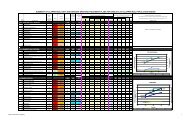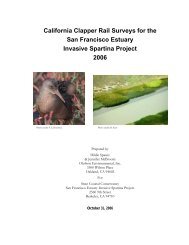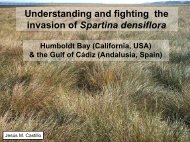Proceedings of the Third International Conference on Invasive ...
Proceedings of the Third International Conference on Invasive ...
Proceedings of the Third International Conference on Invasive ...
- No tags were found...
You also want an ePaper? Increase the reach of your titles
YUMPU automatically turns print PDFs into web optimized ePapers that Google loves.
<str<strong>on</strong>g>Proceedings</str<strong>on</strong>g> <str<strong>on</strong>g>of</str<strong>on</strong>g> <str<strong>on</strong>g>the</str<strong>on</strong>g> <str<strong>on</strong>g>Third</str<strong>on</strong>g> <str<strong>on</strong>g>Internati<strong>on</strong>al</str<strong>on</strong>g> <str<strong>on</strong>g>C<strong>on</strong>ference</str<strong>on</strong>g> <strong>on</strong> <strong>Invasive</strong> SpartinaChapter 4: Spartina C<strong>on</strong>trol and Management<str<strong>on</strong>g>of</str<strong>on</strong>g> California at Davis engaged in a lively debate over <str<strong>on</strong>g>the</str<strong>on</strong>g>feasibility <str<strong>on</strong>g>of</str<strong>on</strong>g> biological c<strong>on</strong>trol with a senior <str<strong>on</strong>g>of</str<strong>on</strong>g>ficial <str<strong>on</strong>g>of</str<strong>on</strong>g> <str<strong>on</strong>g>the</str<strong>on</strong>g>Washingt<strong>on</strong> State Department <str<strong>on</strong>g>of</str<strong>on</strong>g> Agriculture. Citizenslearned about <str<strong>on</strong>g>the</str<strong>on</strong>g> uncertainties comm<strong>on</strong> to research and <str<strong>on</strong>g>the</str<strong>on</strong>g>ways in which enterprising scientists resp<strong>on</strong>d to <str<strong>on</strong>g>the</str<strong>on</strong>g>m. Theywere able to draw <str<strong>on</strong>g>the</str<strong>on</strong>g>ir own c<strong>on</strong>clusi<strong>on</strong>s after hearingfirsthand <str<strong>on</strong>g>the</str<strong>on</strong>g> various sides <str<strong>on</strong>g>of</str<strong>on</strong>g> a debate.LESSON 3: TIME IS OF THE ESSENCEWhen <str<strong>on</strong>g>the</str<strong>on</strong>g> Willapa Bay Spartina invasi<strong>on</strong> becameevident as a serious threat, <str<strong>on</strong>g>the</str<strong>on</strong>g> outside world was not readyto see it as such. In <str<strong>on</strong>g>the</str<strong>on</strong>g> late 1980s, local civic leaders becamec<strong>on</strong>vinced that <str<strong>on</strong>g>the</str<strong>on</strong>g> Spartina invasi<strong>on</strong> was fast becoming anecological disaster. Unfortunately, <str<strong>on</strong>g>the</str<strong>on</strong>g> majority <str<strong>on</strong>g>of</str<strong>on</strong>g>envir<strong>on</strong>mental pr<str<strong>on</strong>g>of</str<strong>on</strong>g>essi<strong>on</strong>als across <str<strong>on</strong>g>the</str<strong>on</strong>g> country had not yetrecognized <str<strong>on</strong>g>the</str<strong>on</strong>g> extent <str<strong>on</strong>g>of</str<strong>on</strong>g> <str<strong>on</strong>g>the</str<strong>on</strong>g> threat posed by invasive species.Within <str<strong>on</strong>g>the</str<strong>on</strong>g> ranks <str<strong>on</strong>g>of</str<strong>on</strong>g> <str<strong>on</strong>g>the</str<strong>on</strong>g> many public agencies withjurisdicti<strong>on</strong>, pr<str<strong>on</strong>g>of</str<strong>on</strong>g>essi<strong>on</strong>al staff held varying views. C<strong>on</strong>flictsover <str<strong>on</strong>g>the</str<strong>on</strong>g> acceptability <str<strong>on</strong>g>of</str<strong>on</strong>g> <str<strong>on</strong>g>the</str<strong>on</strong>g> impacts tied to c<strong>on</strong>troltreatments made a prompt resp<strong>on</strong>se to <str<strong>on</strong>g>the</str<strong>on</strong>g> spread <str<strong>on</strong>g>of</str<strong>on</strong>g> Spartinaimpossible.Resp<strong>on</strong>ses were delayed because <str<strong>on</strong>g>of</str<strong>on</strong>g> <str<strong>on</strong>g>the</str<strong>on</strong>g> availability <str<strong>on</strong>g>of</str<strong>on</strong>g>legal mechanisms for individuals who held c<strong>on</strong>trarian viewsto block agency acti<strong>on</strong> despite support for <str<strong>on</strong>g>the</str<strong>on</strong>g> program by<str<strong>on</strong>g>the</str<strong>on</strong>g> vast majority <str<strong>on</strong>g>of</str<strong>on</strong>g> <str<strong>on</strong>g>the</str<strong>on</strong>g> public. In Willapa Bay, suchchallenges deflected energies and added to <str<strong>on</strong>g>the</str<strong>on</strong>g> costs <str<strong>on</strong>g>of</str<strong>on</strong>g> <str<strong>on</strong>g>the</str<strong>on</strong>g>management effort. C<strong>on</strong>trarian activists made repeatedefforts to derail <str<strong>on</strong>g>the</str<strong>on</strong>g> Spartina c<strong>on</strong>trol program in <str<strong>on</strong>g>the</str<strong>on</strong>g> name <str<strong>on</strong>g>of</str<strong>on</strong>g>envir<strong>on</strong>mental c<strong>on</strong>cern. Their “m<strong>on</strong>keywrenching” tacticswere ultimately defeated by <str<strong>on</strong>g>the</str<strong>on</strong>g> active participati<strong>on</strong> <str<strong>on</strong>g>of</str<strong>on</strong>g> <str<strong>on</strong>g>the</str<strong>on</strong>g>Washingt<strong>on</strong> Chapter <str<strong>on</strong>g>of</str<strong>on</strong>g> <str<strong>on</strong>g>the</str<strong>on</strong>g> Nature C<strong>on</strong>servancy andAudub<strong>on</strong> Society Washingt<strong>on</strong>. It is vital to enlist <str<strong>on</strong>g>the</str<strong>on</strong>g> supportand involvement <str<strong>on</strong>g>of</str<strong>on</strong>g> credible pr<str<strong>on</strong>g>of</str<strong>on</strong>g>essi<strong>on</strong>al envir<strong>on</strong>mentalorganizati<strong>on</strong>s in order to prevent o<str<strong>on</strong>g>the</str<strong>on</strong>g>rs from framing <str<strong>on</strong>g>the</str<strong>on</strong>g>issue in <str<strong>on</strong>g>the</str<strong>on</strong>g>ir own terms. During that early period <str<strong>on</strong>g>of</str<strong>on</strong>g> delay,an aggressive c<strong>on</strong>trol program would have solved <str<strong>on</strong>g>the</str<strong>on</strong>g>problem with <str<strong>on</strong>g>the</str<strong>on</strong>g> least costs and <str<strong>on</strong>g>the</str<strong>on</strong>g> least ecologicalimpacts. Instead, <str<strong>on</strong>g>the</str<strong>on</strong>g> invasi<strong>on</strong> was allowed to accelerate.LESSON 4: SOMEBODY HAS TO BE IN CHARGEIn Willapa Bay, three state agencies and <strong>on</strong>e federalagency are directly engaged in field operati<strong>on</strong>s. They areindependent <str<strong>on</strong>g>of</str<strong>on</strong>g> <strong>on</strong>e ano<str<strong>on</strong>g>the</str<strong>on</strong>g>r, have separate lands, and pursuedifferent missi<strong>on</strong>s. In 1995, <str<strong>on</strong>g>the</str<strong>on</strong>g> Washingt<strong>on</strong> Legislatureenacted RCW 17.26—a statute calling for coordinati<strong>on</strong> <str<strong>on</strong>g>of</str<strong>on</strong>g>Spartina c<strong>on</strong>trol efforts and str<strong>on</strong>g leadership under a singlelead agency. The Legislature designated <str<strong>on</strong>g>the</str<strong>on</strong>g> Washingt<strong>on</strong>State Department <str<strong>on</strong>g>of</str<strong>on</strong>g> Agriculture (WSDA) as <str<strong>on</strong>g>the</str<strong>on</strong>g> leadagency, but also directed that each agency take resp<strong>on</strong>sibilityfor Spartina c<strong>on</strong>trol <strong>on</strong> <str<strong>on</strong>g>the</str<strong>on</strong>g>ir own lands. WSDA hasinterpreted its lead role as comprised <str<strong>on</strong>g>of</str<strong>on</strong>g> two major functi<strong>on</strong>s:it c<strong>on</strong>venes interagency meetings and drafts <str<strong>on</strong>g>the</str<strong>on</strong>g> annual reportto <str<strong>on</strong>g>the</str<strong>on</strong>g> Legislature. WSDA declined to interpret its assignmentexpansively, in o<str<strong>on</strong>g>the</str<strong>on</strong>g>r words to include all missi<strong>on</strong> criticalleadership functi<strong>on</strong>s.Without a single agency in charge, it was impossible for<str<strong>on</strong>g>the</str<strong>on</strong>g> agencies to develop and implement a comprehensive andcoherent l<strong>on</strong>g-term strategy with an appropriate allocati<strong>on</strong> <str<strong>on</strong>g>of</str<strong>on</strong>g>assignments and resp<strong>on</strong>sibilities. Without a single agency incharge, individual agencies were free to pursue <str<strong>on</strong>g>the</str<strong>on</strong>g>irindividual near-term interests ra<str<strong>on</strong>g>the</str<strong>on</strong>g>r than subordinate <str<strong>on</strong>g>the</str<strong>on</strong>g>m to<str<strong>on</strong>g>the</str<strong>on</strong>g> interests <str<strong>on</strong>g>of</str<strong>on</strong>g> <str<strong>on</strong>g>the</str<strong>on</strong>g> overall program. No <strong>on</strong>e agency was in apositi<strong>on</strong> to demand <str<strong>on</strong>g>of</str<strong>on</strong>g> o<str<strong>on</strong>g>the</str<strong>on</strong>g>rs a timetable for success or toassess <str<strong>on</strong>g>the</str<strong>on</strong>g> level <str<strong>on</strong>g>of</str<strong>on</strong>g> funding needed for overall success. No <strong>on</strong>eagency was held accountable for <str<strong>on</strong>g>the</str<strong>on</strong>g> success or failure <str<strong>on</strong>g>of</str<strong>on</strong>g> <str<strong>on</strong>g>the</str<strong>on</strong>g>program. No <strong>on</strong>e agency was motivated to demand adherenceto an overall visi<strong>on</strong> and coordinating scheme. As a result, <str<strong>on</strong>g>the</str<strong>on</strong>g>c<strong>on</strong>trol effort in Willapa Bay drifted down a path that wasunnecessarily expensive and slow. Each agency was free topoint to <str<strong>on</strong>g>the</str<strong>on</strong>g> inadequacies <str<strong>on</strong>g>of</str<strong>on</strong>g> <str<strong>on</strong>g>the</str<strong>on</strong>g> program withoutresp<strong>on</strong>sibility for <str<strong>on</strong>g>the</str<strong>on</strong>g> whole. From presentati<strong>on</strong>s during thisc<strong>on</strong>ference, it is obvious that <str<strong>on</strong>g>the</str<strong>on</strong>g> California CoastalC<strong>on</strong>servancy’s <strong>Invasive</strong> Spartina Project has very competent,hard-working staff. They have generated a number <str<strong>on</strong>g>of</str<strong>on</strong>g>impressive documents that will go a l<strong>on</strong>g way toward gainingcooperati<strong>on</strong> through persuasi<strong>on</strong>. Our experience tells us thatcoordinati<strong>on</strong> will require more than persuasi<strong>on</strong>. Legal andcoercive authority will probably be needed.LESSON 5: SELL THE NEED FOR SCIENCELooking back, I now think that <strong>on</strong>e <str<strong>on</strong>g>of</str<strong>on</strong>g> our biggest errorswas that we did not argue strenuously enough for a seriousm<strong>on</strong>itoring and research effort in <str<strong>on</strong>g>the</str<strong>on</strong>g> early years. We neverpersuaded our political leadership <str<strong>on</strong>g>of</str<strong>on</strong>g> <str<strong>on</strong>g>the</str<strong>on</strong>g> importance <str<strong>on</strong>g>of</str<strong>on</strong>g>m<strong>on</strong>itoring and research designed to inform <str<strong>on</strong>g>the</str<strong>on</strong>g> managementeffort. From <str<strong>on</strong>g>the</str<strong>on</strong>g> outset, we should have more adequatelycountered <str<strong>on</strong>g>the</str<strong>on</strong>g> str<strong>on</strong>g antipathy towards spending dedicatedfunds <strong>on</strong> research. Public hostility towards research wasunderstandable: substantial sums had been spent exploring<str<strong>on</strong>g>the</str<strong>on</strong>g> n<strong>on</strong>-target impacts <str<strong>on</strong>g>of</str<strong>on</strong>g> c<strong>on</strong>trol tools that had beenapproved for years and used without problems in a widevariety <str<strong>on</strong>g>of</str<strong>on</strong>g> settings. Some <str<strong>on</strong>g>of</str<strong>on</strong>g> <str<strong>on</strong>g>the</str<strong>on</strong>g> scientists involved in earlyresearch were seen as biased. They were more c<strong>on</strong>cernedwith <str<strong>on</strong>g>the</str<strong>on</strong>g> short-term and minor effects <str<strong>on</strong>g>of</str<strong>on</strong>g> c<strong>on</strong>trol tools thanwith <str<strong>on</strong>g>the</str<strong>on</strong>g> l<strong>on</strong>g-term ecological devastati<strong>on</strong> wrought by <str<strong>on</strong>g>the</str<strong>on</strong>g>invasi<strong>on</strong> itself. In at least <strong>on</strong>e case, a scientist was politicallyaffiliated with groups opposed to <str<strong>on</strong>g>the</str<strong>on</strong>g> use <str<strong>on</strong>g>of</str<strong>on</strong>g> herbicides. Thisbiased him to propose a research plan designed to ignore <str<strong>on</strong>g>the</str<strong>on</strong>g>l<strong>on</strong>gterm implicati<strong>on</strong>s <str<strong>on</strong>g>of</str<strong>on</strong>g> <str<strong>on</strong>g>the</str<strong>on</strong>g> Spartina invasi<strong>on</strong> whilehighlighting <str<strong>on</strong>g>the</str<strong>on</strong>g> very transient benefits <str<strong>on</strong>g>of</str<strong>on</strong>g> Spartina increating edge habitat. O<str<strong>on</strong>g>the</str<strong>on</strong>g>r scientists participating in <str<strong>on</strong>g>the</str<strong>on</strong>g>project objected to <str<strong>on</strong>g>the</str<strong>on</strong>g> inherent bias and forced a redesign <str<strong>on</strong>g>of</str<strong>on</strong>g><str<strong>on</strong>g>the</str<strong>on</strong>g> workplan. In <str<strong>on</strong>g>the</str<strong>on</strong>g> end, because <str<strong>on</strong>g>the</str<strong>on</strong>g> results were not to <str<strong>on</strong>g>the</str<strong>on</strong>g>liking <str<strong>on</strong>g>of</str<strong>on</strong>g> <str<strong>on</strong>g>the</str<strong>on</strong>g> politically motivated scientist, he refused topublish <str<strong>on</strong>g>the</str<strong>on</strong>g> results. This intenti<strong>on</strong>al blurring <str<strong>on</strong>g>of</str<strong>on</strong>g> science andpolitics undermined trust in good science. It also led <str<strong>on</strong>g>the</str<strong>on</strong>g>- 231 -







